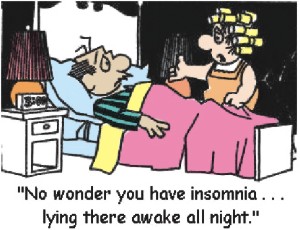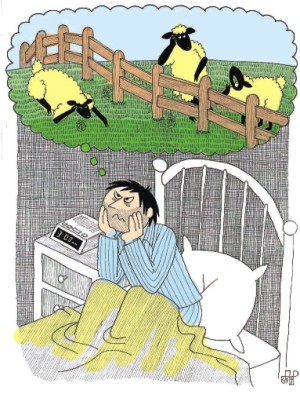|
Health
Eyes Wide Open
Anika Hossain
 I have been having trouble sleeping for as long as I can remember. During my teens and throughout college life, being able to stay up all night and not feel tired the next day seemed like the best thing that could have ever happened to me. I used the time to catch up on my homework, my gossip and most importantly movies and TV shows, which were banned while my parents were awake. I think I had the best times of my life while most people were fast asleep, but all good things must come to an end and so it did. It happened slowly, kind of crept up on me gradually, but I realised one day that while I still spent sleepless nights, it was getting harder to function during the days. Unlike the old days, very few of my friends chose to stay awake after joining the real world, which included jobs, families and a million responsibilities. I had no homework to keep me busy and parental guidance was no longer required to watch television during the day. So out of sheer boredom I tried to fall asleep and was shocked to find I just couldn't. I had always assumed sleep was something, which would come naturally when I was ready for it, but no matter how many sheep I counted I just could not get myself to slumber land. I have been having trouble sleeping for as long as I can remember. During my teens and throughout college life, being able to stay up all night and not feel tired the next day seemed like the best thing that could have ever happened to me. I used the time to catch up on my homework, my gossip and most importantly movies and TV shows, which were banned while my parents were awake. I think I had the best times of my life while most people were fast asleep, but all good things must come to an end and so it did. It happened slowly, kind of crept up on me gradually, but I realised one day that while I still spent sleepless nights, it was getting harder to function during the days. Unlike the old days, very few of my friends chose to stay awake after joining the real world, which included jobs, families and a million responsibilities. I had no homework to keep me busy and parental guidance was no longer required to watch television during the day. So out of sheer boredom I tried to fall asleep and was shocked to find I just couldn't. I had always assumed sleep was something, which would come naturally when I was ready for it, but no matter how many sheep I counted I just could not get myself to slumber land.
I was in denial for a while before I realised I had a problem, but when I finally came to terms with it, I looked up a few things I found useful before planning to get help. My research told me that sleep disorders are fairly common and can be cured or at least kept under control given proper treatment. Symptoms for sleep disorders are easy to recognise. For example, if you stop breathing frequently while you sleep, you probably have Sleep Apnea. This usually happens either when there is some sort of obstruction in your throat when you sleep, more commonly known as Obstructive Sleep Apnea, or because there is a delay in the signal from your brain, which tells you to breathe, known as Central Sleep Apnea. Obstructive apnea can occur if you are overweight and/or have consumed alcohol before going to bed. Both obstructive and central apnea will make you wake up hundreds of times during the night to catch your breath, but you may not even remember this the next morning. If you have someone sleeping next to you, he/she might be able identify your problem. Symptoms to look out for would be: loud snoring, waking up unrefreshed and having trouble staying awake during the day, waking up with headaches, waking up during the night with the sensation of choking, waking up sweating and with a dry throat, frequent trips to the bathroom during the night, insomnia - problem staying asleep, waking and gasping for air, rapid weight gain high blood pressure, depression and reduced libido. Sleep apnea shouldn't be taken lightly, because it can be potentially life threatening. Risks of untreated apnea include, heart attack, strokes, heart disease and impotence among other things. The treatment for apnea can range from behavioral changes to surgical treatment depending on the severity of the case.
Insomnia is probably the one sleep disorder everyone had heard of. It also happens to be what I have been diagnosed with. Insomniacs will either have difficulty falling asleep, or will have no trouble falling asleep at all, but will have difficulty staying asleep throughout the night, some may complain that they wake up too early, while others will sleep throughout the night but will claim they have not slept a wink. Any sleep disorder can disguise itself as insomnia so it is very important to rule out each disorder. Insomnia can be caused by medication, herbs or caffeine, stressful life events can also be a contributing factor to insomnia, anxiety can also be a reason but if the anxiety is caused by a long history of insomnia then anxiety is not the problem, the underlying cause may be the key to discovering the reason for insomnia. Physical pain can sometimes be a cause of insomnia as well. Mental problems can also be a possibility. There are three basic types of insomnia, which include, transient insomnia, which lasts for a few nights, short-term insomnia which usually means two or four weeks of poor sleep and chronic insomnia which causes a month or more of sleepless nights. In some people, insomnia can be perpetuated by the following behaviours: poor sleep hygiene in general, expecting to have difficulty sleeping and worrying about it, ingesting excessive amounts of caffeine, drinking alcohol before bedtime, smoking cigarettes before bedtime, excessive napping in the afternoon or evening, irregular or continually disrupted sleep/wake schedule. Difficulty sleeping is only one of the symptoms of this disorder, there are day time symptoms as well, some of which include sleepiness, anxiety, impaired concentration, impaired memory or judgement and irritability. Medication as well as behavioral techniques such as relaxation therapy, sleep restriction therapy, reconditioning and bright light treatment can be used to help cure insomnia.
 Another sleep disorder, which is important to know about, is narcolepsy. Narcoleptics can sleep for twelve hours at a stretch but will still feel an irresistible urge to sleep once they are awake. People with narcolepsy tend to fall asleep anywhere and everywhere (while driving, eating, at work, even while talking). These "sleep attacks" last for thirty seconds to thirty minutes or more and narcoleptics may also experience limpness of muscle all over their bodies when this happens. Narcolepsy is a chronic illness, which affects the part of the brain, which controls the regulation of sleep and wakefulness. It can be hereditary at times but environmental factors can also contribute to it. The main symptoms of this illness include: excessive sleepiness, temporary decrease or loss of muscle control, especially when you are excited, vivid-dreamlike images while falling asleep or just before waking up, and waking up and being unable to move or speak for a very short period of time. While there is no cure for narcolepsy, the symptoms can be controlled using behavior therapy. Sleepwalking or Somnambulism is a series of complex behaviours that are initiated during sleep and result in walking during sleep. It is usually very difficult waking the patient during an episode and amnesia immediately follows after awakening. Sleepwalking can occur in varying frequency and can be harmful at times. It is best to try relaxation techniques before falling asleep, remove anything from the bedroom which can be hazardous or harmful, get plenty of rest because stress often triggers sleepwalking, hypnosis can be helpful at times for both children and adults, an accurate psychiatric evaluation and proper medication can also help control the symptoms of sleepwalking. Another sleep disorder, which is important to know about, is narcolepsy. Narcoleptics can sleep for twelve hours at a stretch but will still feel an irresistible urge to sleep once they are awake. People with narcolepsy tend to fall asleep anywhere and everywhere (while driving, eating, at work, even while talking). These "sleep attacks" last for thirty seconds to thirty minutes or more and narcoleptics may also experience limpness of muscle all over their bodies when this happens. Narcolepsy is a chronic illness, which affects the part of the brain, which controls the regulation of sleep and wakefulness. It can be hereditary at times but environmental factors can also contribute to it. The main symptoms of this illness include: excessive sleepiness, temporary decrease or loss of muscle control, especially when you are excited, vivid-dreamlike images while falling asleep or just before waking up, and waking up and being unable to move or speak for a very short period of time. While there is no cure for narcolepsy, the symptoms can be controlled using behavior therapy. Sleepwalking or Somnambulism is a series of complex behaviours that are initiated during sleep and result in walking during sleep. It is usually very difficult waking the patient during an episode and amnesia immediately follows after awakening. Sleepwalking can occur in varying frequency and can be harmful at times. It is best to try relaxation techniques before falling asleep, remove anything from the bedroom which can be hazardous or harmful, get plenty of rest because stress often triggers sleepwalking, hypnosis can be helpful at times for both children and adults, an accurate psychiatric evaluation and proper medication can also help control the symptoms of sleepwalking.
The main characteristic of sleep terrors is when a person wakes up from deep sleep with a piercing scream or cry, accompanied by autonomic and behavioral manifestation of intense fear. This is also known as night terror. Sleep terror is often followed by partial or total amnesia for the events during the episode. In the severest form, sleep terrors occur nightly and can cause physical harm or injury. People suffering from Sleep Bruxism tend to grind or clench their teeth during sleep. They usually have abnormal wear of teeth, make sounds as pleasant as fingernails on a chalkboard while they sleep and experience jaw muscle discomfort. Those who experience this often display dental injury, jaw disorders, other types of physical injury and mild or severe psychological impairment.
Fibromyalgia is characterized by chronic pains in muscles, ligaments and tendons. This is also known as rheumatic pain modulation disorder and the symptoms include unrefreshing sleep, muscular pain and firm tender zones around the neck and shoulder muscles. A low dose of anti depressants usually helps relieve these symptoms.
Lastly, there is Hypersomnia or excessive sleepiness. Persons suffering from hypersomnia experience a deep and prolonged major sleep period and may have difficulty waking up. This is believed to be caused by the central nervous system. A sleep specialist needs to be consulted in these cases and behaviour therapy in these cases can help normalise sleep patterns.
So those were some of the sleep-associated disorders I looked up while trying to learn about my own symptoms and I have to say I found the information helpful. I wanted to share this because some of these illnesses can be overlooked or dismissed easily but left untreated can become extremely dangerous for the sufferers and those around them. If you find any of these symptoms familiar it would be advisable to consult a sleep specialist, psychologist or psychiatrist without delay to get the help you most definitely need.
Sources: DSM IV and various Internet sources
Copyright
(R) thedailystar.net 2010
|

